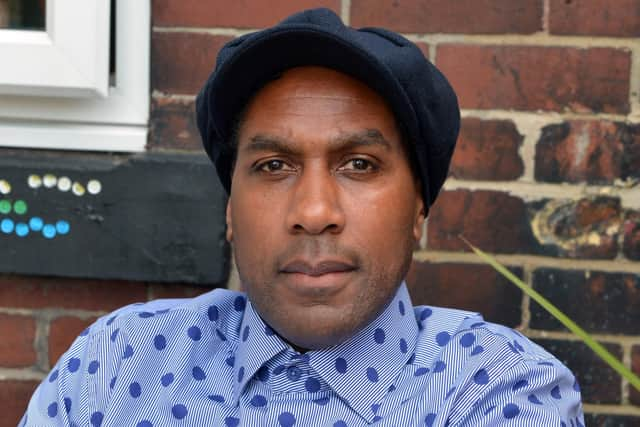Police abuse, monkey chants and how I ended up attending an EDL party - author shares experience of racism in Sheffield
and live on Freeview channel 276
Julian Antonio McKenzie’s parents were part of the Windrush generation who came from the Caribbean to help rebuild Britain after the Second World War, and his was one of the only black families on Sheffield’s Wybourn estate when he grew up there in the 70s and 80s.
He wrote about that period in his memoir Wybourn Black, in which he describes enjoying a relatively idyllic childhood despite the estate’s fearsome reputation at the time but also recounts the racist abuse he faced from police and on the football terraces.
Advertisement
Hide AdAdvertisement
Hide AdThe 52-year-old father-of-six, who has four grandchildren, perhaps surprisingly says he experienced very little racism as a young boy and found it easy to make friends on the estate – proof, he believes, that nobody is born racist.


“My sister and I were very young when we moved to Wybourn, and when you’re young you just realise your friend has different coloured skin and nothing else. Maybe it would have been different if we moved when we were teenagers,” he said.
“I made so many friends through football. It doesn’t matter whether they’re pink or red with white spots, if you’re short on numbers and want a game of football you’ll ask someone. That’s how we bonded.”
That's not to say he was oblivious to racism as a young boy.
Advertisement
Hide AdAdvertisement
Hide AdHis mother used Enoch Powell, whose notorious Rivers of Blood speech stoked up racial tensions, as a bogeyman, while his father enjoyed watching the controversial sitcom Love Thy Neighbour.
Julian’s first experience of police racism came as a teenager, when he was stopped for the first of what would be many times while walking home from his girlfriend’s home in Dore and Totley after missing the last bus.
“They asked ‘where are you going, w**?’,” he said.
“I told them where I’d been but they kept saying ‘are you sure, because you’ve been spotted in and around people’s gardens.
“At that time police had a reputation for dishing out blows and kicks so I feared the worst but in the end they just said ‘on your way’.”
Advertisement
Hide AdAdvertisement
Hide AdJulian believes police are less racist today than they were during his youth, and he understands why stop-and-search is still used to counter knife crime but is worried by the glaring examples of police injustice people still face.
It wasn’t just police Julian had to worry about as a young man.
He recalls hearing monkey chants on the terraces at Hillsborough, where a fan once turned to him and said ‘not you, pal, you’re one of ours’.
“I wanted to nail him,” he said.
“Footballers still suffer racism but I would challenge them to play the game in the 70s and 80s when there were fewer black footballers and the abuse they got was horrendous.”
Advertisement
Hide AdAdvertisement
Hide AdVisiting nightclubs as a young man, Julian says, his white friends would get in but he would often be turned away if there were already ‘too many’ black people inside.
Julian has never been one to turn down a party, even when it might be safest to do so, which is how he once ended up attending an English Defence League bash in Halifax.
“I do a lot of 2 Tone artwork and someone saw it and called me and asked me to display my work at an EDL member’s birthday party, not realising I was black,” he said.
“When I arrived there was no one there so I began measuring up and as I was doing so people started to appear at the door.
Advertisement
Hide AdAdvertisement
Hide Ad“Eventually one of them was brave enough to ask ‘can we help you?’, at which point I held my hand out and introduced myself.
“He reached out his hand and I could tell what he was thinking but I came out of that party with 150 new friends, or acquaintances.
“People may not tolerate me but I will tolerate them.”
Like people everywhere, Julian was horrified by George Floyd’s death at the hands of police in the US.
“There has to be justice for George Floyd and all the George Floyds who have gone before but we haven’t spoken about,” he said.
Advertisement
Hide AdAdvertisement
Hide AdJulian welcomes both the removal of statues of slave traders like Edward Colston and the apologies from TV stars for using blackface, even if he does question their sincerity.
As for what needs to change, for Julian the answer is simple.
“People just need to treat everybody else the same. We’re all human beings,” he says.
“Close your eyes, take a deep breath and open them again. I tell my children ‘be proud of who you are and don’t let anyone tell you otherwise’….
Advertisement
Hide AdAdvertisement
Hide Ad“I’m a father now and I've passed the baton on like my parents passed it on to me. I hope they pick it up and run with it because thanks to the internet and social media they have a more powerful voice than we ever did. This is their time.”
Julian has just finished his fifth book, Bringing Back The Legend That Is, which he hopes will be published soon.
It tells the tale of striker Steve Cammack, who grew up on the Wybourn estate and after a short spell at Sheffield United went on to become Scunthorpe United’s record goalscorer.
“In a world where you have the Premier League and your Messis and Ronaldos, this is the very different story of an 80s footballer who had to get a different job when the season finished,” said Julian.